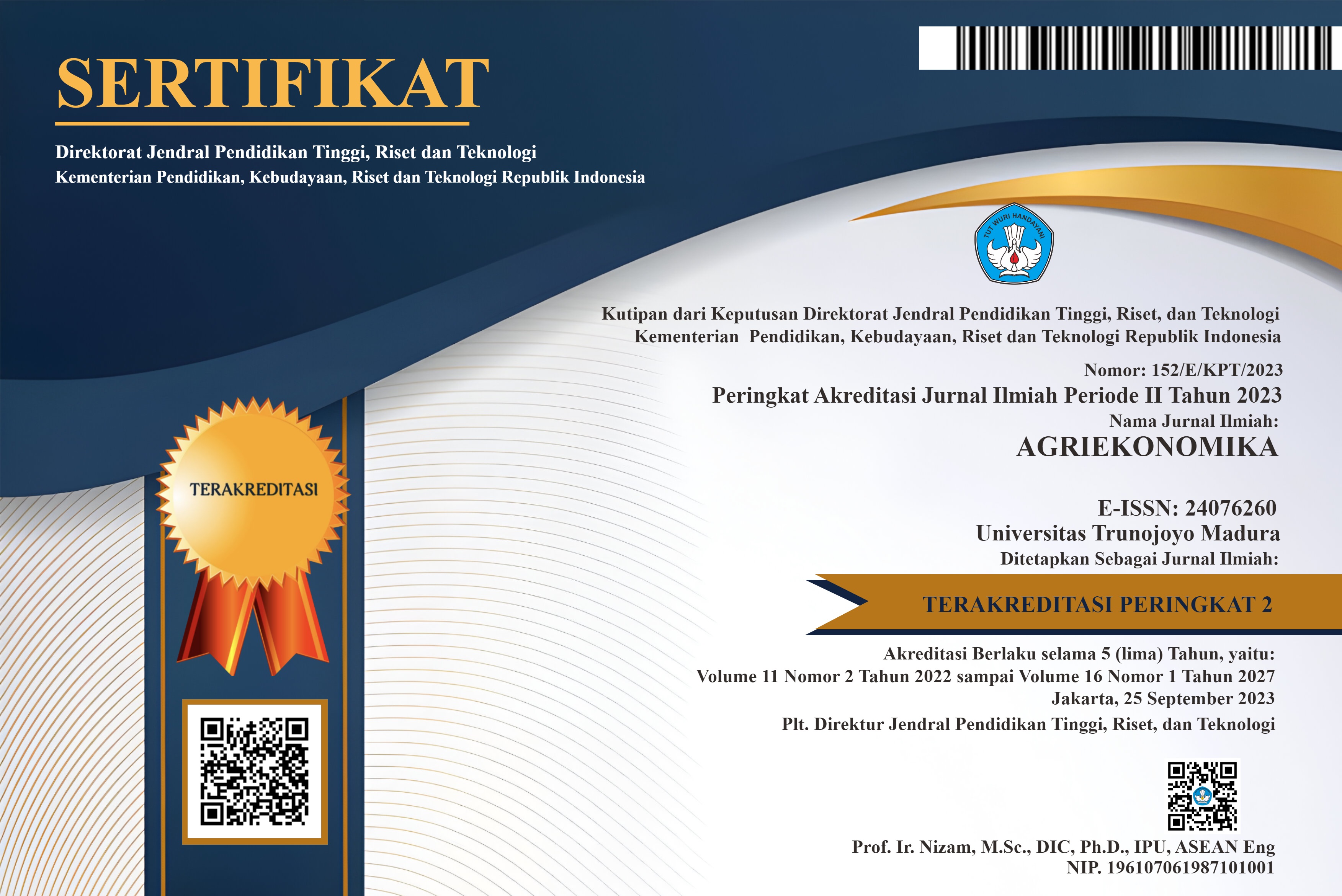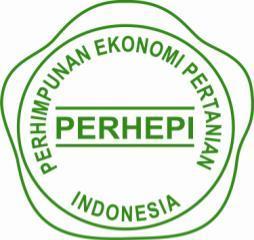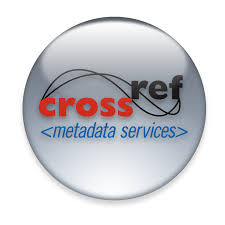Profit Analysis of Timor Deer Utilization from Two to Four Years of Age
Abstract
This research aimed to analyze the profitability of Timor deer (Rusa timorensis) beyond sexual maturity from ages 2 to 4 years old. Parameters like carcass, viscera, skin, antler, and velvet from nine bucks were used. Edible meat, skin, antler and velvet were harvested and weighed. Economic profitability was compared for each age groups (2, 3 and 4 year) including the antler and velvet. Descriptive analysis used for comparing Timor deer at different ages were presented. The result of this research showed that the profitability of Timor deer at various ages were 2,236,138; 1,643,957 and 4,283,693 IDR for 2, 3 and 4 years, respectively inclusive of velvet. Inclusive of antler, the profitability Timor deer with varying ages were 2,986,138; 1,993,957 and 3,583,693 IDR for 2, 3 and 4 years, respectively. Based on economic profitability it is therefore most profitable for Timor deer to raise them until 4 years of age (twice the velvet and 0.33 more antler).
Keywords
Full Text:
PDFReferences
Estevez, J. A., Landete-Castillejos, T., Martínez, A., García, A. J., Ceacero, F., Gaspar-López, E., Calatayud, A., & Gallego, L. (2009). Antler mineral composition of Iberian red deer Cervus elaphus hispanicus is related to mineral profile of diet. Acta Theriologica, 54(3), 235–242. https://doi.org/10.4098/j.at.0001-7051.070.2008
Hoffman, L. C., & Wiklund, E. (2006). Game and venison - meat for the modern consumer. Meat Science, 74(1), 197–208. https://doi.org/10.1016/j.meatsci.2006.04.005
Huber, P., Kurttila, M., Hujala, T., Wolfslehner, B., Sanchez-Gonzalez, M., Pasalodos-Tato, M., de-Miguel, S., Bonet, J. A., Marques, M., Borges, J. G., Enescu, C. M., Dinca, L., & Vacik, H. (2023). Expert-Based Assessment of the Potential of Non-Wood Forest Products to Diversify Forest Bioeconomy in Six European Regions. Forests, 14(2). https://doi.org/10.3390/f14020420
Krisna, P. A. N., Supriatna, J., Suparmoko, M., & Garsetiasih, R. (2020). Sustainability of Timor Deer in Captivity: Captive Breeding Systems in West Java, Indonesia. Tropical Conservation Science, 13. https://doi.org/10.1177/1940082920915651
Kudrnáčová, E., Bartoň, L., Bureš, D., & Hoffman, L. C. (2018). Carcass and meat characteristics from farm-raised and wild fallow deer (Dama dama) and red deer (Cervus elaphus): A review. In Meat Science (Vol. 141, pp. 9–27). Elsevier Ltd. https://doi.org/10.1016/j.meatsci.2018.02.020
Landete-Castillejos, T., Currey, J. D., Ceacero, F., García, A. J., Gallego, L., & Gomez, S. (2012). Does nutrition affect bone porosity and mineral tissue distribution in deer antlers? The relationship between histology, mechanical properties and mineral composition. Bone, 50(1), 245–254. https://doi.org/10.1016/j.bone.2011.10.026
Makmun, A., Samsudewa, D., & Ondho, Y. S. (2017). Kadar NaCl dan pH Lendir Serviks Rusa Timor (Rusa timorensis) Betina yang Mendapat Suplementasi Mineral selama Siklus Estrus Levels NaCl and pH Mucous of Female Timor Deer (Deer timorensis) Getting Mineral Supplementation during Estrous Cycle. In Jurnal Sain Peternakan Indonesia (Vol. 12, Issue 3).
Muchlis, D., & Nurcholis, N. (2020). Timor Deer (Cervus Timorensis) Arrest System Marind People with Tidal Local Wisdom. Chalaza Journal of Animal Husbandry, 4(2), 59–62. https://doi.org/10.31327/chalaza.v4i2.1136
Okuskhanova, E., Assenova, B., Rebezov, M., Yessimbekov, Z., Kulushtayeva, B., Zinina, O., & Stuart, M. (2016). Mineral Composition of Deer Meat Pate. Pakistan Journal of Nutrition, 15(3), 217–222
Pathak, N. N., Pattanaik, A. K., Patra, R. C., & Arora, B. M. (2001). Mineral composition of antlers of three deer species reared in captivity. Small Ruminant Research, 42, 61–65
Purwaningsih, W., Samsudewa, D., & Ondho, Y. S. (2018). Profil Lendir Serviks Rusa Timor (Cervus Timorensis) Betina Yang Mendapat Suplementasi Mineral Pada Tiap Fase Berahi. Jurnal Sain Peternakan Indonesia, 13(2), 202–213.https://doi.org/10.31186/jspi.id.13.2.202-213
Rasyidi, G. (2022). Study of Timor Deer Behavior at the Exit Conservation Location of Cakura Village, Takalar Regency. International Journal of Multidisciplinary Research and Analysis, 05(08), 2165–2180. https://doi.org/10.47191/ijmra/v5-i8-36
Reznikova, K. V., Seredkina, N. N., & Zamaraeva, Y. S. (2017). Perspective Formats for the Development of Decorative and Applied Art of the Indigenous Peoples of the Krasnoyarsk Territory. Journal of Siberian Federal University. Humanities & Social Sciences, 10(10), 1573–1593. https://doi.org/10.17516/1997-1370-0155
Safithri, A., Samsudewa, D., Koesoemowardojo, R. S., & Semarang, K. (2018). Profil Hematologi pada Rusa Timor ( Cervus timorensis ) Betina Berahi yang Disuplementasi Mineral pada Satu Siklus Berahi Profile of Hematology of Female Timor Deer ( Cervus timorensis ) Suplemented with Minerals in Estrus Cycle PENDAHULUAN Rusa merupakan. Jurnal Sain Veteriner, 13(1), 63–75.
Samsudewa, D., Cazpitan, S. S., Sevilla, C. C., Vega, R. S. A., & Ocampo, P. P. (2017). Body measurements and testosteron level of male Timor deer (Rusa timorensis) at various hierarchies. Journal of the Indonesian Tropical Animal Agriculture, 42(4). https://doi.org/10.14710/jitaa.42.4.227-232
Samsudewa, D., Capitan, S. S., Sevilla, C. C., Vega, R. S. A., & Ocampo, P. P. (2018). Hematologic Profile and Semen Quality of Male Timor Deer (Rusa timorensis) at Various Hierarchies. IOP Conference Series: Earth and Environmental Science, 119(1).https://doi.org/10.1088/1755-1315/119/1/01202
Santosa, Y., Kwatrina, R. T., & Kartono, A. P. (2012). Penentuan sistem penangkaran rusa timor (rusa timorensisde blainville 1822) berdasarkan jatah pemanenandan ukuran populasi awal. Media Konservasi, 17(2), 55–64.
Skonhoft, A., Veiberg, V., Gauteplass, A., Olaussen, J. O., Meisingset, E. L., & Mysterud, A. (2013). Balancing income and cost in red deer management. Journal of Environmental Management, 115, 179–188. https://doi.org/10.1016/j.jenvman.2012.11.006
Steiner-Bogdaszewska, Ż., Tajchman, K., Ukalska-Jaruga, A., Florek, M., & Pecio, M. (2022). The Mineral Composition of Bone Marrow, Plasma, Bones and the First Antlers of Farmed Fallow Deer. Animals,12(20). https://doi.org/10.3390/ani12202764
Takandjandji, M., Rianti, A., & Sudaryo, C. (2020). The economic value of velvet from Timor deer captive breeding at Dramaga Forest Research. IOP Conference Series: Earth and Environmental Science, 533(1) https://doi.org/10.1088/1755-1315/533/1/012025
Takandjandji, M., & Setio, P. (2014). Nilai Finansial Penangkaran Rusa Timor Di Hutan Penelitian Dramaga, Bogor. Jurnal Penelitian Hutan Dan Konservasi Alam, 11(1), 53–76. https://doi.org/10.20886/jphka.2014.11.1.53-76
Yuliawati, A., Listiawati, M., Santosa, Y., & Thohari, A. M. (2019). Optimum sustainable population estimation of Rusa timorensis in Pananjung Pangandaran nature reserve and natural park. Journal of Physics: Conference Series, 1402(3). https://doi.org/10.1088/1742-6596/1402/3/033051
DOI: https://doi.org/10.21107/agriekonomika.v12i2.16845
Refbacks
- There are currently no refbacks.







